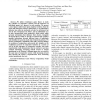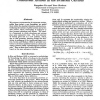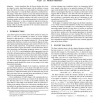66 search results - page 3 / 14 » A Formal Model of Emotion-Based Action Tendency for Intellig... |
IAT
2010
IEEE
13 years 3 months ago
2010
IEEE
We utilize evolutionary game theory to study the evolution of cooperative societies and the behaviors of individual agents (i.e., players) in such societies. We present a novel pla...
AAAI
1992
13 years 7 months ago
1992
We propose a representation of concurrent actions; rather than invent a new formalism, we model them within the standard situation calculus by introducing the notions of global ac...
KI
2009
Springer
14 years 10 days ago
2009
Springer
Abstract. We study the integration of two prominent fields of logicbased AI: action formalisms and non-monotonic reasoning. The resulting framework allows an agent employing an ac...
AOSE
2005
Springer
13 years 11 months ago
2005
Springer
Autonomy has always been conceived as one of the defining attributes of intelligent agents. While the past years have seen considerable progress regarding theoretical aspects of a...
ECAI
2004
Springer
13 years 11 months ago
2004
Springer
Action formalisms like the fluent calculus have been developed to endow logic-based agents with the abilities to reason about the effects of actions, to execute high-level strateg...



